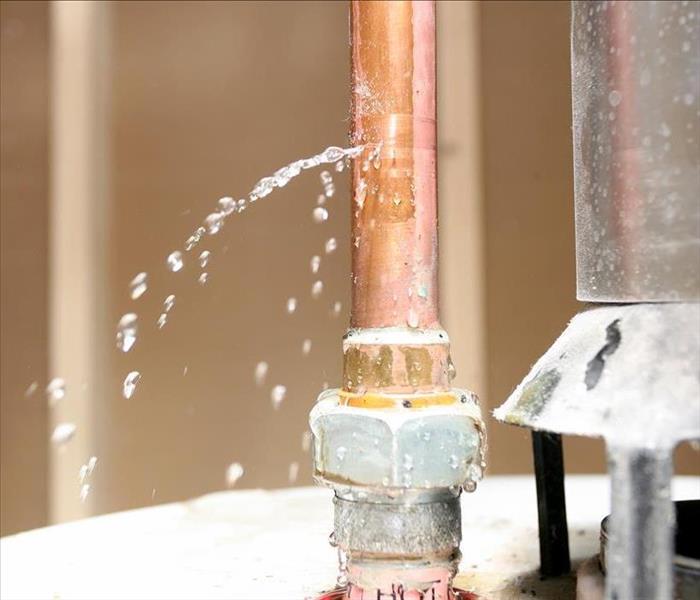Preventing Water Damage from Leaking Pipes
7/12/2021 (Permalink)
 Even when you're prepared, accidents happen! Call us and we will be there to help restore your home ASAP when facing water damage.
Even when you're prepared, accidents happen! Call us and we will be there to help restore your home ASAP when facing water damage.
No homeowner wants to deal with water damage from a leaking pipe. In addition to possibly flooding your home, a pipe leak can wreak havoc in a number of ways. Warped, stained walls, dangerous mold, and ruined carpet and furnishings are just a few of the consequences of an unattended leak. The best way to avoid all of that chaos is to prevent the leaks in the first place.
To properly avoid water damage from a leaking pipe, you must first understand the factors that come into play with pipe leaks.
- Pipe corrosion can eat away at metal pipes and cause leaks.
- Cracks indicate weakness in a pipe and will eventually cause the pipe walls to give way.
- The seals that keep your plumbing system’s connections from leaking can fail.
- Blockages in your pipes cause pressure to build up and cause leaks.
- Damaged joints can be caused by different things, like pipes expanding or contracting or poor workmanship.
- High water pressure can stress weak points in your plumbing system and cause a pipe burst or leaks.
- Foundation shifts can cause water lines to disconnect or rupture.
- Extreme temperature changes can cause pipes to crack and leak.
- Tree root intrusion happens when root systems put pressure on your pipes.
- Fixture cracks happen because of physical impact to a fixture or the surrounding pipes.
The water damage repair after a leak can be extensive. It’s important to know how to shut off the water in your house so that if a problem occurs you can minimize the extent of the damage and reduce your water damage cleanup. To prevent leaks in the first place:
- Keep an eye on your pipes for signs of visible corrosion. Green spots on copper, for instance, indicate cold water pitting.
- Listen to your pipes. Rattling, shock, or vibration when you turn the water on or off can indicate an issue.
- Replace old piping. Start watching it at 20 years and replace it by about 40.
- Look for staining on sinks or taps. Blue or green stains can indicate high concentrations of carbon dioxide or a low pH, which can corrode pipes and fittings.
- Soften your water. Hard water can cause pitting, so treat it before it creates a problem.
- Watch the water pressure. If the pressure goes above 80psi/552kPa or a velocity of more than 4FPS a pipe burst can occur.
- Monitor your water usage. Watch the water meter and look to your water company for historical usage data. Unexplained water usage could mean a hidden leak.
- Consider smart systems. New smart technology allows you to monitor humidity in order to detect leaks.
Sometimes, despite your best efforts, your home will sustain water damage from a leaky pipe. If that happens to your Jacksonville Beaches area home, call SERVPRO of Jacksonville Beach/Ponte Vedra for help with water damage restoration. Our highly-trained restoration technicians have the experience and equipment to restore your Jacksonville Beach, Neptune Beach, Atlantic Beach, or Ponte Vedra home or business and get everything back to normal. A trusted leader in the water restoration industry, we’ve served our community for more than 40 years. Call (904) 246-6118 or contact us through our website.





 24/7 Emergency Service
24/7 Emergency Service